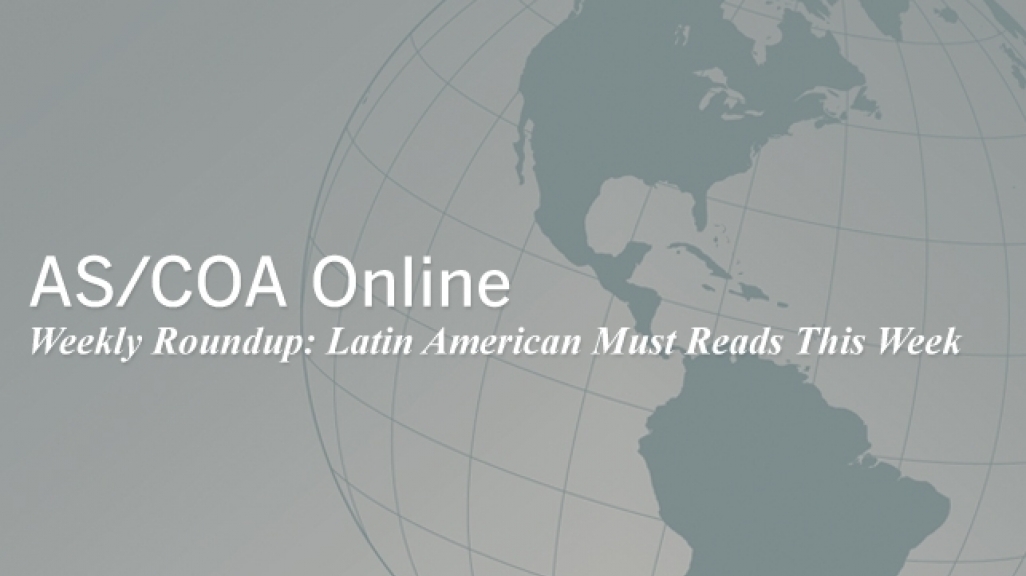Weekly Roundup: Colombia's Peace Talks, Mexico's Protests, Brazil's New Economic Team
Weekly Roundup: Colombia's Peace Talks, Mexico's Protests, Brazil's New Economic Team
The U.S. president announces executive action on immigration, Honduras cuts military spending, and the number of Latin Americans studying in the United States rises. Read these stories and more.
Executive Action on Immigration Offers Deportation Relief, Boosts Border Security
On Thursday evening, U.S. President Barack Obama announced long-awaited executive action on immigration, including deferred deportation for around 4 million undocumented immigrants, expanding deferred action for undocumented youth to an additional 300,000 people, and increasing border security, among other measures. The move will also affect around 600,000 people by expanding visa programs for entrepreneurs and science and technology graduates. Obama’s plan will end the controversial Secure Communities program allowing police to check the immigration status of those under arrest. It will be replaced by the new Priority Enforcement Program, which will target security risks and felons.
Find out why immigrants matter to the U.S. economy in a new infographic.
Mexican Government Poised to Slash Budget on Disappearance Investigations
Protests in Mexico continued this week following the disappearance of 43 students from Guerrero state, with tens of thousands marching in Mexico City. A nationwide strike took place on November 20, a holiday celebrating the start of the Mexican Revolution. In remarks yesterday, President Enrique Peña Nieto said that an attack on institutions is an attack on all Mexicans; earlier in the week, he said protests were an effort at “destabilization” of his administration. However, Christian Science Monitor and other outlets described the November 20 protests as “largely peaceful.”
This week, Mexico's National Register of Missing and Disappeared People said it had recorded 5,098 disappearance cases from January to October 2014, an increase of 584 over the entirety of 2013. At the same time, Animal Politico reported that the Mexican government is set to cut the budget for investigating disappearances by 63.5 percent next year.
Find out how the case has evolved in recent weeks.
With Peace Talks Suspended, Cuba and Norway Help Colombia Negotiate Hostage Release
This week, the Colombian government suspended peace talks after the Revolutionary Armed Forces of Colombia (FARC) kidnapped a general. In a communique released shortly after his capture, the FARC confirmed the details of the general’s abduction and called for a bilateral ceasefire in exchange for his release. But just a few days later, the guerrillas agreed to release five kidnapped individuals, including General Rubén Darío Alzate. Cuban and Norwegian representatives involved in the peace process facilitated the negotiation between the FARC and the government. The FARC could release Alzate as early as today, reports Semana.
Report: Rousseff to Announce New Economic Team
Brazilian President Dilma Rousseff was expected to reveal her new economic team today, a government source told O Globo, though subsequent reports said she will not make the announcement yet. The source said she will tap former Deputy Finance Minister Nelson Barbosa and former Treasury Secretary Joaquim Levy as ministers of finance and planning. Folha de São Paulo and Valor reported that Levy will become finance minister, with Barbosa in the planning ministry. Central Bank President Alexandre Tombini is expected to keep his post.
Watch a Q&A with former Brazilian Central Bank governor Arminio Fraga about Brazil’s economic future.
Obama Administration Would Support Sanctions on Venezuela
National Security Advisor Tony Blinken told lawmakers this week that the Obama administration may pursue sanctions against Venezuela, reports Reuters. Since the government barred Venezuelan officials accused of committing human rights abuses from entering the United States in July, the president resisted any further sanctions. But that could change, says Blinken, who told a group of senators that the administration “would look forward to working with you to go further.” Senator Marco Rubio (R-FL) sponsored a bill earlier this year to pursue sanctions, but the measure has not received full Senate approval.
Learn about Venezuela’s protests earlier this year that spurred the push for sanctions.
In Honduras, Military Spending Cuts for 2015
Honduras cut its security and defense budget by 5 percent for the upcoming fiscal year, reports Infodefensa. The spending cut amounts to a $20.1 million decrease, putting the final budget at $383.4 million. Meanwhile, the Security Assistance Monitor projects that U.S. military aid to Honduras next year will be 9.5 percent less than in 2014. The Central American country has one of the world’s highest homicide rates, and this week made international headlines after the murder of beauty queen Miss Honduras.
U.S. Midterms: Latino Voter Turnout Stagnates
An analysis this month from the Pew Research Center shows that while the number of eligible Latino voters was higher than ever, Latinos only comprised 8 percent of voters—the same rate as in midterm elections in 2010 and 2006. The report also found that Democrats maintained their advantage among Latino voters during November’s midterm elections, when 62 percent of Latino voters cast ballots for Democratic congressional candidates.
More Latin Americans Heading to the U.S. for Higher Education
The number of Latin American and Caribbean university students studying in the United States rose 8.2 percent in the last year, according to new data from the Institute for International Education. In total, over 72,000 students from the region came to the United States during the 2013/2014 school year. Paraguay and Brazil saw the biggest increases at 24.6 percent and 22.2 percent, respectively. In fact, Brazil has now entered the top 10 countries sending students to the United States, just behind Mexico.
Read an AQ feature examines the success of science and technology-focused exchange programs between the United States and Latin America.







